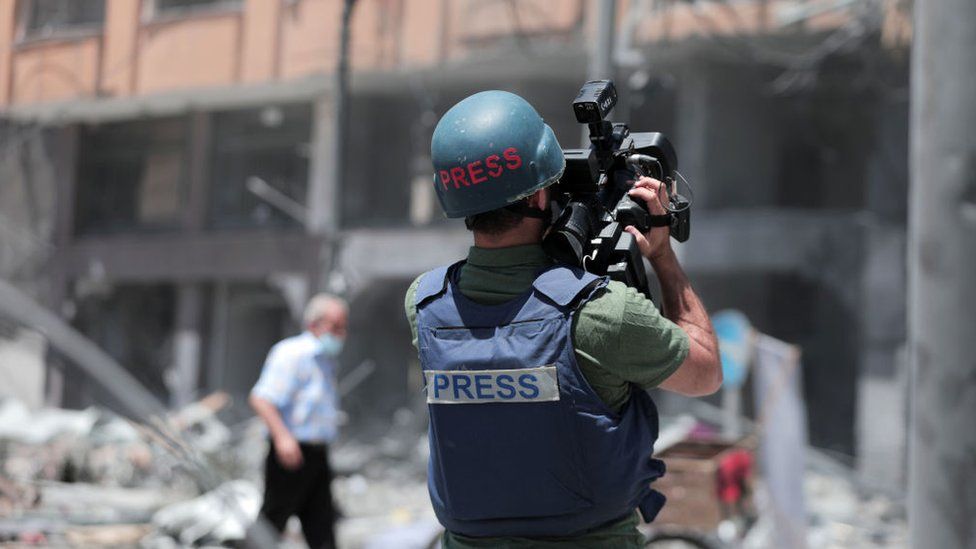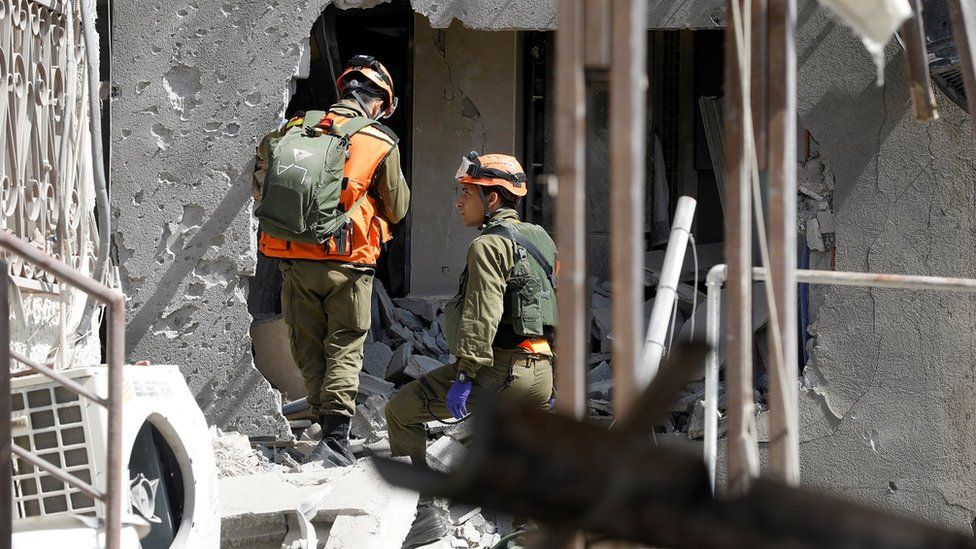
Israel's air strikes on the militant Hamas movement in Gaza have forced the Middle East on to Joe Biden's agenda amid new questions about how his emphasis on human rights applies to Palestinians.
It has also laid bare the extent to which the Israeli right has been empowered in occupied East Jerusalem during the presidency of Donald Trump. Unrest there sparked wider battles, and could draw the Biden administration more deeply into the longstanding Israeli-Palestinian conflict even after this latest seismic eruption abates.
That's a prospect President Biden and his senior advisers would like to avoid.
They've made clear their diplomatic priorities lie elsewhere. Until now they've adopted a low-key minimalist approach in this graveyard of American-led peace initiatives, quietly trying to restore some elements of US policy upended by the Trump administration's unabashedly pro-Israel stance.
That has meant concentrating on repairing ruptured relations with the Palestinians, and voicing rhetorical support for a viable Palestinian state as key to a lasting peace with Israel.
But they've calculated the prospects for a new round of negotiations as bleak, and are determined to shift the focus of American foreign policy to China.
Familiar pattern
The sudden shift back to the Middle East this week has seen a return to a traditional pattern.
In public statements the president and his Secretary of State Antony Blinken have forcefully repeated the standard American formula about Israel's right to self-defence in the face of Palestinian rocket fire.

While expressing concern about the mounting number of Palestinians killed in Israeli air strikes, Mr Blinken has drawn a "clear and absolute distinction" between "a terrorist organisation targeting civilians, and Israel… targeting the terrorists".
Biden has seen no "significant overreaction" in the Israeli response to the barrage of Hamas missiles, a judgment that some analysts took as an implicit green light for the operation to continue, despite US calls for calm.
Hussein Ibish of the Arab Gulf States Institute says Washington typically gives Israel an initial "carte blanche" to respond to rocket attacks "until they think Israel has had enough of a chance to do what it needs to do" to destroy militant infrastructure.
Read more from Barbara
Diplomatic reengagement?
The Biden administration also blocked UN Security Council action this week, where the US often stands alone in defending Israel from criticism, arguing that a statement or public meeting would hinder behind-the-scenes diplomacy. It has now agreed to an emergency session on Sunday.
But it had to rapidly step up its game on the diplomatic front without a full team in place; there is not even a nominee yet for ambassador to Israel.
Mr Blinken and other senior officials have been working the phones with their Israeli counterparts. There have been urgent calls with Arab countries to try to help shape a regional response led by Egypt.
And the secretary of state has dispatched his top official for Israeli and Palestinian affairs, Hady Amr, to the region, although Mr Amr is a mid-level diplomat without the kind of rank held by special envoys in previous administrations.
"One signal of a more resolute stance in the behind-the-scenes diplomacy would have been to send someone more senior," says Daniel Kurtzer, a former US ambassador to Israel.
Red lines in Jerusalem
Devastating as it is, the Gaza air strikes are familiar territory, unlike the explosion of unrest in Jerusalem which sparked them.
The eastern part of the city - captured by Israel in 1967, claimed by the Palestinians and home to holy sites for both - has always been a flashpoint. Its future was set to be determined in peace negotiations. But right-wing Israeli governments together with Jewish settler groups have been squeezing out the Palestinians, and that activity became particularly brazen during the Trump administration.

President Biden's team did not notice warning signs that this was becoming combustible, says Hussein Ibish. "What it failed to do was prevent the Israeli right, both the settler movement and government, from pressing forward with really provocative moves on the ground."
A campaign by the settlers to evict dozens of Palestinian families triggered a wave of protests. That was amplified by Palestinian anger over heavy-handed Israeli policing at the Al-Aqsa mosque, located on a mount revered by Muslims and Jews. There was also fury about plans for right-wing Jewish nationalists to march there through a Muslim neighbourhood, which was called off at the last minute.
The conflagration spread to demonstrations of solidarity by Palestinian citizens of Israel. And that has triggered a new and alarming wave of communal violence in Israeli cities with mixed Arab and Jewish populations.
The Biden administration must set red lines, says Daniel Kurtzer.
It needs to tell the Israeli government to "Just stop it!" when it comes to provocative steps in East Jerusalem, he says. "They should say we support Israel's right to self-defence, but [this activity] needs to come to an end."
The State Department did issue a statement calling for de-escalation on both sides in Jerusalem, shortly before the Hamas rocket fire changed the conversation. And Mr Blinken has declared deep concern about the "violence in the streets of Israel".
But it is "a portent of things to come", says Ibish.
What about the human rights agenda?
Another challenge for the Biden administration is how to apply its message of a return to values-based foreign policy to the realities on the ground in Israel, Gaza and the West Bank.
In recent statements, Mr Blinken has repeated that Palestinians and Israelis "deserve equal measures of freedom, dignity, security and prosperity".
Khaled El Gindy of the Brookings Institute calls the formula "new and significant", but also vague and puzzling: "Does it apply to the here and now?" he wonders. "Or is it aspirational in a final status arrangement? It hasn't been operationalised, so we don't know where it fits in. I think they don't know."
The left-wing of the Democratic Party has become increasingly vocal about criticizing what it sees as the glaring asymmetry in the exercise of all four values.
It is not clear what sort of political impact this will have: the lawmakers challenging the Democrats' traditional pro-Israel stance may not be inclined to a showdown with Biden because he has championed key causes that they cherish on the economy and climate.
But they are pushing to apply universal standards of human rights and international law to the treatment of Palestinians. They are calling for the administration to use the $3.8bn in annual Israeli military aid as leverage to that end. And in speeches on the House floor on Thursday, some framed it as a racial justice issue.
Ayanna Pressley, from Massachusetts, who is black, said she was "no stranger to police brutality and state-sanctioned violence".
What the Biden administration would like, says Kurtzer, is "to see the current round of Israel-Hamas fighting coming to an end, the situation in Jerusalem devolving into whatever you consider to be normal and then they can go back and focus on other things".
But the chant "No justice - No peace" one of the rallying cries at anti-racist protests in the US, rang out at a Palestinian demonstration held in front of the State Department this week.
Depending on the "new normal", this may serve to be a persistent way of keeping the Israeli-Palestinian conflict on the Biden agenda.
World - Latest - Google News
May 15, 2021 at 09:04AM
https://ift.tt/3fgTX72
Israeli-Palestinian conflict gives Biden foreign policy headache - BBC News
World - Latest - Google News
https://ift.tt/2SeTG7d
Bagikan Berita Ini














0 Response to "Israeli-Palestinian conflict gives Biden foreign policy headache - BBC News"
Post a Comment